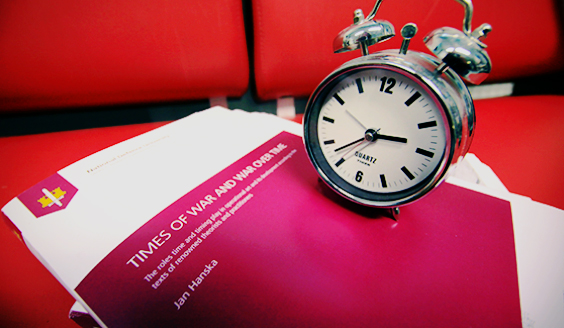Dissertation on the meaning of time in operational art
Public examination of Major Jan Hanska’s doctoral dissertation will be held at the National Defence University on Friday 21st May 2017. It is a dissertation in tactics and operational art and the public examination will take place in Martola Auditorium, from 10.00 onwards.

The custos will be Lieutenant Colonel (ret.) Jari Rantapelkonen, a docent of the National Defence University. The opponent will be Colonel (ret.) Pasi Kesseli, a docent of the National Defence University.
The title of the dissertation is "Times of War and War over Time – The roles time and timing play in operational art and its development according to the texts of renowned theorists and practitioners." The dissertation has analyzed how conception of time and timing in operational art has developed throughout time. The meaning time has been given has varied depending both on the goals of each individual war and the development level of the societies waging it. Therefore, agrarian societies and their wars are characterized by the notion of cyclical time, tied to sunrise and sunset, the phase of moons, and seasons. For them it was necessary to identify a promising moment to initiate action.
The industrial society started to properly measure and quantify time and attempted to be effective and to produce as much as possible in any given period of time. An information society has more tools at its disposal for its art of war through increased mobility, stand-off effects and better systems of surveillance, target acquisition, command, and control. Meanwhile the potential speed of operational art has accelerated to a level where it is no longer fully controllable by human intellect. This is why the speed of warfare has to be curtailed when necessary and a suitable rhythm has to be sought for all activities. The relative edge gained by being faster diminishes and the ability to find an auspicious Kairos-moment to act upon increases in importance. By causing discord in the rhythm of the enemy one is able win time. Time is important in warfare when it is conceived of in terms of what can be accomplished during a given period of time by utilizing it optimally. Time, space, and force create a trinity and the manipulation of their interrelationships is the crux of operational art. The biggest gains in time can be made in the realm of intellect and effecting surprises – not through speed of movement and action.
In operational art haste is the enemy of good and time must be effectively managed
Information age armies and their operational artists must excel in producing knowledge and intelligence from the information available. Traditionally active, strong willed and energetic commanders have carried the day on battlefields of the past. In the multidimensional battlespace of today these commendable characteristics must be supplemented with intuition, imagination, flexibility of thought and action and the ability to abide with uncertainty. Today we are in the midst of a transformation from information age to one of networks and robotics and it is essential to create new methods and means to manage time. In operational art haste is to be avoided and operations need to be synchronized and timed in accordance to a suitable rhythm. There is no one single way to envision the role of time in operational art since it depends inseparably on manipulation of time in each moment depending on the desired outcome. The operational artist must simultaneously squeeze every possible advantage out of every single second and be able to capitalize on the occurring kairos-moments while actively attempting to create more of them.
Hanska’s dissertation can be downloaded and read online from the National Defence University's Doria publication archive.
Major Jan Hanska graduated from the National Defence University in 2001 and completed his General Staff Course in 2013. He has served in various posts in the Finnish Defence Forces. Currently he serves in the Doctrine and Concepts Division of the Finnish Defence Research Agency. He has gained a doctoral degree (Doctor of Social Sciences) from the University of Tampere in 2010 and he is a docent of International Relations and military studies of the University of Lapland.
Welcome to the public examination
The event is open to the general public. Because it will take place in a restricted military area, we kindly ask that you register beforehand using the following link. www.lyyti.in/vaitos_hanska. The registration link is open until 17th April 2017. The public examination will be conducted in Finnish.
For more information:
Major Jan Hanska, tel. +358 (0)405756054 tai [email protected]
For more information on the arrangements of the day, please contact Public Information Officer Henna Ristikangas, tel. 0299 530 121 or [email protected]



